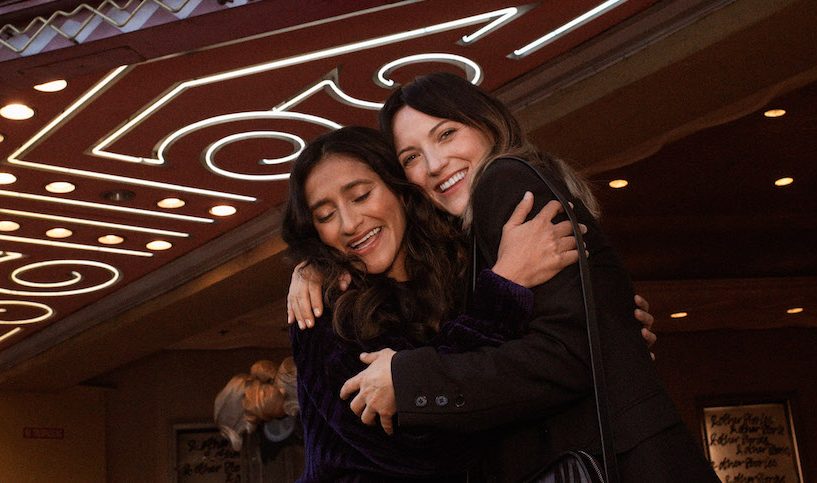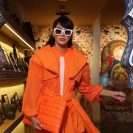Jen Kirkman and Aparna Nancherla are renowned comics. But they also embody many of & Other Stories’ values and message of empowerment. The brand is known for being female-driven and brought the two women together to create an endearing holiday campaign. The off-stage special is about holidays, sisterhood, ready-ness, clothing and dressing your pets.
Aparna Nancherla is one one of America’s most relatable female comics today. She has appeared several times on “Inside Amy Schumer”, regularly appears on highly praised podcasts, web-series and on the Netflix special The Stand Ups. She has a huge social media following and has no trouble with telling it like it is. Jen Kirkman like many comedians before her, has used her life as inspiration for her art and it has paid off with a great career. Not only is she a fantastic stand-up, she is also a screenwriter, actress, wrote a bestselling memoir and has starred in two Netflix specials.
The collection itself is for these comedy stars and the rest of us. We all have to stand up sometimes, find our voice and speak out. The right outfit might seem like an afterthought, but we are constantly expressing our identities and our values through how we look. The sleek suits, smart shirts and sequins will help you stand out in any situation.
And while the two women’s careers have revolved around making us laugh, they have also used their position on stage to talk about things that are important to themselves and other women. Off the stage, not everything they say is going to make you giggle, but it will always make you think. In their own words, they answered some questions that we all wanted to know the answers for.
How would you describe your comedy persona?
Aparna: Describing your own act is never easy, but maybe if I switch to the third person, it will help. She’s pretty dry and thoughtful, innocent yet world-weary, mired in measured neuroses, but with a streak of absurdist goofball. She’s happy to share a few ideas, but she’s definitely not going to force you to listen if you’re not in the mood.
How was it collaborating with Aparna on this campaign?
Jen: Stand-up comedy may be a solo endeavor, but comedians still have a bond. We both live the same crazy life and we just “get” each other. Even though we don’t normally walk arm in arm, like we did for the photos, the spirit of that made sense. We’re sisters in this.
In her show, Nanette, Hannah Gadsby has said that as a woman she is no longer comfortable doing self-deprecating jokes. How do you feel about that?
Aparna: I loved Nanette so much. It really deconstructed the power structures inherent in joke-telling in a complex and beautiful way. I have often relied heavily on self-deprecating jokes in my own comedy, whether talking about body issues or mental health, but I understand that there isn’t necessarily resolution in self-deprecation. Oftentimes, it’s used as a defense mechanism, and I know that because my Psych 101 class diagnosed me as someone who uses humor as a defense mechanism.
In the comedy special for & Other Stories you wore both sequins and a satin suit. What do your clothes mean to you?
Jen: I usually want to look one of two ways – like David Bowie or like Iris Apfel. I like to wear clothes that feel fun, whether they are huge bell bottoms or a big faux fur coat. The look from today that I would most wear on stage is the black satin suit with the black and white stars shirt. A part of my on-stage persona is my clothing – it makes me feel so connected and proud when women tell me that my fearlessness in the way I dress makes them want to dress for themselves instead of their dates.
What does gender equality look like to you, as a comedian?
Aparna: Historically, I think female comedians have been unfairly judged for talking a lot about their appearance, body issues, or their personal life, even though these pressures are often placed on women by society. So of course we want to talk about them on stage! It’s almost as if women are expected to default to ‘heterosexual male’ interests to be considered real comedians, which is a bias coming from the audience and other comedians, rather than the performer themselves.
I think true equality comes when anyone can talk about their actual experiences onstage, without being considered niche or gimmicky. That will mean both comedy audiences and the comedy community opening their minds, taking in more diverse experiences and unique points of view.
Have you noticed a change in the way comedians, particularly women, get treated in the industry?
Jen: When I first started out in comedy in the late 1990’s, if the person booking the comedy show was a man then he’d only ever book one woman, often none at all. I think what’s changed now is that we no longer accept that; we’ve started to speak up. Even though we could lose work for ourselves by promoting other women, we do it anyway. Of course we want audiences to like us, our jobs depend on it, but it’s never been the audiences that are sexist. Club bookers may have told us that women aren’t funny, but the audiences were always laughing.
Why do you think comedians are particularly well-placed to tackle politics right now?
Aparna: Comedy has taken on a singular place in speaking truth to power. I think we can engage young people in issues they might not yet care about or be interested in, by making them laugh. I did an event with the UN recently where a CEO from Mythos Labs, Priyank Mathur, talked about making videos with female comedians in India and Indonesia to help engage and empower counter-terrorism initiatives. Fighting apathy is one of the best things comedy can do, by introducing people to new ideas in a more accessible, less threatening way.
What do you want to speak about in your comedy at the moment?
Jen: I want to use my comedy to try to get men to understand that women’s stories can be their stories too. I grew up watching TV shows, seeing movies and reading books that had male protagonists but always just thought of their stories as human stories. Somehow, women’s stories are thought of as just women’s stories. I want men to know that women are people. I know that sounds ridiculous, but in a weird way I don’t think that men think of women as people. I’m not saying they think we are insects, but they’ve been socialized to think that we’re not like them. We are all human. And even if I’m making jokes about my period (which I now proudly do) I make sure to find a way for them to relate to why I’m telling that story.
If you had to pass on one single piece of advice either to an aspiring comic what would that be?
Aparna: Trust your gut over what you think is funny. Don’t try and write like anyone but yourself. Sometimes comedians might start off sounding like another person they admire, but hopefully, eventually, you’ll get a brand of funny that is more authentically you.
Jen: Don’t assume you know what success will look like. Don’t assume that after a certain point it will all be smooth sailing. It’s a lifestyle, and a passion and you are not owed anything.
Also, don’t yell on stage; they can hear you. That’s what the microphone is for.
Watch the full campaign video here.








